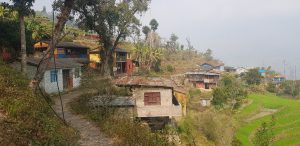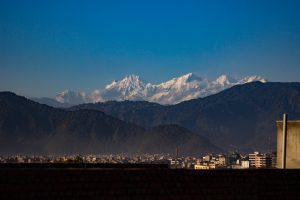August 24, 2020, by sustainablenottingham
Energy- A Universal Challenge?
A guest post by Ben Robinson, a PhD student within the Food, Water, Waste Research Group. Ben discusses his recent work in Nepal and the social, environmental and economic intersections he found there.
 Energy and sustainability are like peanut butter and jam, fish and chips or eggs and bacon (for you bacon lovers out there), they are so intrinsically linked that it becomes impossible to talk about one without the other. This is especially true in my focus country Nepal, where 60% of the population don’t have access to clean sources of energy, where thousands die due to the smoke produced from burning firewood to cook, heat themselves, purify water, preserve food and satisfy their socio-cultural tradition of sitting round the fire and passing on the stories of a different generation. The fundamental issue is this; wood is free, other more sustainably produced and managed sources of energy are not. This is, and will remain, a significant issue for researchers like me trying to persuade rural households to transition from something familiar to something new.
Energy and sustainability are like peanut butter and jam, fish and chips or eggs and bacon (for you bacon lovers out there), they are so intrinsically linked that it becomes impossible to talk about one without the other. This is especially true in my focus country Nepal, where 60% of the population don’t have access to clean sources of energy, where thousands die due to the smoke produced from burning firewood to cook, heat themselves, purify water, preserve food and satisfy their socio-cultural tradition of sitting round the fire and passing on the stories of a different generation. The fundamental issue is this; wood is free, other more sustainably produced and managed sources of energy are not. This is, and will remain, a significant issue for researchers like me trying to persuade rural households to transition from something familiar to something new.
Whilst I have presented this issue here as fairly simple, in reality it is far from it. The complex relationship between individuals, community, state, government and in some cases international donors is balanced against the complex socio-cultural, economic and environmental contextual needs of rural Nepali households. In all honesty, the sector in Nepal is suffering because of it. Even with a fairly robust Government Policy framework around renewable energy access and subsidies, individuals like cooking on an open fire and in the case of a major disaster, like the 2015 earthquake, there is no other option. Think of your own life for a second – don’t we all love a BBQ?

The similarities don’t end there either, in your kitchen at home you have a kettle, microwave, oven, gas-cooker and a toaster? This use, or ‘stacking’, of multiple technologies is seen in the Nepali kitchen too. Firewood for rice, gas for curry, a bigger fire outside to cook for the cows, a kerosene cooker for when gas is too expensive, a biodigester outside for cooking in the summer, a small portable rocket stove which can be moved around – the specific use of each technology is tailored to the convenience of using it. Now, what is the most sustainable way forward? Its difficult to ask households to give up the open fire if that need is not replaced by another technology. Is it more sustainable to only use gas which is an extracted energy source and imported from India? Or is it better to sustainably manage the community forests so they are not devastated by communities just trying to survive?
These are difficult decisions, especially for a country who contribute 0.01% to global carbon emissions and
 are one of the first to see its consequences due to the proximity of the Himalayas. Already Nepal’s rainy seasons have changed, floods and landslides are a monthly occurrence and clean drinking water from the glaciers is rapidly reducing.
are one of the first to see its consequences due to the proximity of the Himalayas. Already Nepal’s rainy seasons have changed, floods and landslides are a monthly occurrence and clean drinking water from the glaciers is rapidly reducing.
If, like me, you are thinking ‘wow that’s awful’ the next step is to do something about your own contribution to climate change, either through lobbying your university to change the way it uses energy, change your home energy provider to one that only uses renewable energies or just stop buying a new coffee cup every time you go to Starbucks. If we all do something, things for these rural Nepalis households will change, but if we don’t then many will continue to be lost in landslides, floods, famine and disaster. The choices we make in terms of our energy consumption impact people around the world, if we don’t set the example then who will?
If you want to chat about this, or our new project – Project Sahel, a scientific research expedition exploring the energy needs of the Sahel region in Africa – get in touch!
You can contact Ben via benjamin.robinson@nottingham.ac.uk.
No comments yet, fill out a comment to be the first

Leave a Reply